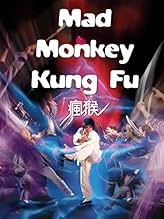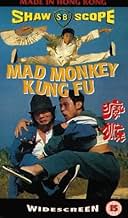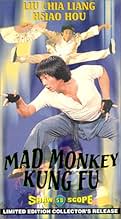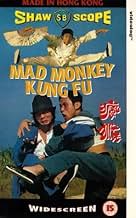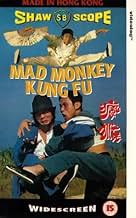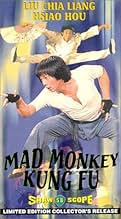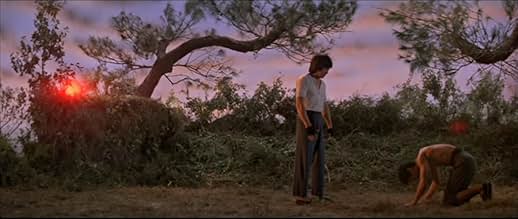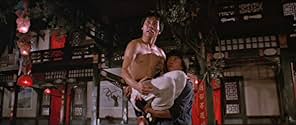AVALIAÇÃO DA IMDb
6,7/10
1,3 mil
SUA AVALIAÇÃO
Adicionar um enredo no seu idiomaA kung fu expert is tricked by a gangster into believing he has committed adultery, so his sister becomes a concubine, and his hands are damaged beyond repair. Years later, he teaches a stre... Ler tudoA kung fu expert is tricked by a gangster into believing he has committed adultery, so his sister becomes a concubine, and his hands are damaged beyond repair. Years later, he teaches a street hustler Monkey Kung-Fu, and they take revenge.A kung fu expert is tricked by a gangster into believing he has committed adultery, so his sister becomes a concubine, and his hands are damaged beyond repair. Years later, he teaches a street hustler Monkey Kung-Fu, and they take revenge.
- Prêmios
- 1 indicação no total
Kara Ying Hung Wai
- Miss Chen
- (as Ying-Hung Hui)
Wing-Hon Cheung
- Green Dragon
- (as Yung-Han Chang)
Fung Ging-Man
- Stage Manager
- (as Ging-Man Fung)
Avaliações em destaque
Feng Hou, or Mad Monkey Kung Fu as its English title is known, is deceptively well crafted. On the surface, a classic master and student Kung Fu story well known to those familiar with Shaw brothers films and Kung Fu cinema in general, but underneath the incredible martial display, athleticism, and humour of the film lies an incredible meditation on succumbing to one's vices, pride, and the inevitable fall that follows.
Lau Kar Leung needs no introduction, as one of the finest martial artists and martial arts choreographers, he also directs this film in addition to playing one the leads, the crippled Kung Fu master Chen. Lo Lien also puts on an exceptional performance as the conniving and thoroughly evil, Tuan. Another staple actor of Shaw brothers films, Hsiao Ho, shines in a rare performance as a lead as the eponymous Monkey. His acrobatics and good natured performance as the outsider, Monkey is amazing and endearing.
Lau Kar Leung needs no introduction, as one of the finest martial artists and martial arts choreographers, he also directs this film in addition to playing one the leads, the crippled Kung Fu master Chen. Lo Lien also puts on an exceptional performance as the conniving and thoroughly evil, Tuan. Another staple actor of Shaw brothers films, Hsiao Ho, shines in a rare performance as a lead as the eponymous Monkey. His acrobatics and good natured performance as the outsider, Monkey is amazing and endearing.
In "Mad Monkey Kung Fu," Liu Chia-liang temporarily veered away from his successful Shaolin formula to experiment with the animal-style slapstick that had made Jackie Chan an overnight sensation. It's not a bad film (and it's fun to see Liu taking on a starring role for the first time), but it lacks the gravity of "Executioners from Shaolin" and "The Thirty-Sixth Chamber of Shaolin"...and suffers from script inconsistencies and odd pacing, to boot.
Chen (Liu) is a talented opera performer with a weakness for liquor. Local tycoon and all-around jerk Tuan (Lo Lieh) frames Chen for rape, taking Chen's sister (Kara Hui) as his concubine and breaking Chen's hands so that he no longer poses a threat. Chen becomes a street performer and is befriended by a young man known only as Monkey (Hsiao Ho). Hot-headed and a little simple, Monkey is always getting into trouble with a gang of thugs, so Chen teaches him how to defend himself. It turns out that the thugs work for Tuan, and when Monkey gives them a sound beating, he also incurs Tuan's wrath. Chen is finally obliged to intervene despite his apparently ruined hands.
The production values are top-notch (they always were in Shaw Brothers films), and the martial arts choreography is of course flawless, but Ni Kuang's script is noticeably disjointed. Chen's whole existence is upended in one overly busy fifteen-minute scene, after which Tuan's character disappears from the film for an extended period. Implausibly, Chen does not attempt to remain in contact with his sister and seems to have no idea that the thugs harassing him and Monkey are Tuan's men (though it's fairly obvious all along). Finally, events veer from the comic to the tragic and back again with a dizzying lack of warning, making "Mad Monkey Kung Fu" a schizophrenic viewing experience. See it for the fights, especially the climactic confrontation at Tuan's brothel. Objectively speaking, this is not Liu Chia-liang's greatest moment; subjectively, your rating will depend on your tolerance level for traditional Chinese comedy and capering monkey impersonations.
Chen (Liu) is a talented opera performer with a weakness for liquor. Local tycoon and all-around jerk Tuan (Lo Lieh) frames Chen for rape, taking Chen's sister (Kara Hui) as his concubine and breaking Chen's hands so that he no longer poses a threat. Chen becomes a street performer and is befriended by a young man known only as Monkey (Hsiao Ho). Hot-headed and a little simple, Monkey is always getting into trouble with a gang of thugs, so Chen teaches him how to defend himself. It turns out that the thugs work for Tuan, and when Monkey gives them a sound beating, he also incurs Tuan's wrath. Chen is finally obliged to intervene despite his apparently ruined hands.
The production values are top-notch (they always were in Shaw Brothers films), and the martial arts choreography is of course flawless, but Ni Kuang's script is noticeably disjointed. Chen's whole existence is upended in one overly busy fifteen-minute scene, after which Tuan's character disappears from the film for an extended period. Implausibly, Chen does not attempt to remain in contact with his sister and seems to have no idea that the thugs harassing him and Monkey are Tuan's men (though it's fairly obvious all along). Finally, events veer from the comic to the tragic and back again with a dizzying lack of warning, making "Mad Monkey Kung Fu" a schizophrenic viewing experience. See it for the fights, especially the climactic confrontation at Tuan's brothel. Objectively speaking, this is not Liu Chia-liang's greatest moment; subjectively, your rating will depend on your tolerance level for traditional Chinese comedy and capering monkey impersonations.
This is another great movie I had the good fortune to see for the first time on the big screen (thanks to Rick Baker et al). Back in the late 80's I was a relative newcomer to the genre and only really knew about the big three JC, SH & YB. I wasn't sure what to expect when I paid my hard earned money to see this in a "Triple bill of Classics" at the old Scala. I need not have worried, I was left breathless by this movie. If you're a fan of Hong Kong Action / Kung Fu movies and haven't seen this movie, do so NOW!
I recently watched this movie again, bit of a nostalgia weekend (May 2011), and was blown away all over again. Really is a top notch Kung Fu movie, they don't get much better! I'm pretty sure I will not be leaving it quite so long before it gets another viewing!
I recently watched this movie again, bit of a nostalgia weekend (May 2011), and was blown away all over again. Really is a top notch Kung Fu movie, they don't get much better! I'm pretty sure I will not be leaving it quite so long before it gets another viewing!
I generally dislike comedy in my kung fu, and prefer straight up revenge tales. Mad Monkey Kung Fu, strangely enough, combines both, but ultimately is more comedic than I would like.
That's not to say Chia-Liang Liu's direction isn't as good as ever, his choreographies mind-blowing and the kung fu on display impressive. My only gripe with the film, and the reason I largely didn't enjoy it, is that everything is utterly silly. I guess the monkey style kung fu is inherently silly, in and off itself, but Little Monkey's fights with Lo Lieh's thugs are more circus fare, complete with grimaces and silly quirks, than straight up kung fu.
What I DID like where the training scenes, where Master Chan trains Little Monkey (played over the top, and given his role, right on the money, by Hou Hsiao) in the ways of the monkey fu, . It's still very much played for laughs but pleasantly so.
Anyways, overall good performances by Hsiao, Lo Lieh and the foxy Kara Hiu (unfortunately in a short role), great choreographies as usual by Chia-Liang Liu, but too light-hearted for my tastes.
That's not to say Chia-Liang Liu's direction isn't as good as ever, his choreographies mind-blowing and the kung fu on display impressive. My only gripe with the film, and the reason I largely didn't enjoy it, is that everything is utterly silly. I guess the monkey style kung fu is inherently silly, in and off itself, but Little Monkey's fights with Lo Lieh's thugs are more circus fare, complete with grimaces and silly quirks, than straight up kung fu.
What I DID like where the training scenes, where Master Chan trains Little Monkey (played over the top, and given his role, right on the money, by Hou Hsiao) in the ways of the monkey fu, . It's still very much played for laughs but pleasantly so.
Anyways, overall good performances by Hsiao, Lo Lieh and the foxy Kara Hiu (unfortunately in a short role), great choreographies as usual by Chia-Liang Liu, but too light-hearted for my tastes.
Liu Chia-Liang or Lau Kar-Leung learned martial arts from his father who was a student of Lam Sai-Wing who was the number one student of Wong Fei-Hung. He learned fight choreography on the set of the early Wong Fei Hung movies starring Kwan Tak-Hing. I consider him to be the greatest man in the history of martial arts movies and dub him the Grandmaster.
A perfect martial arts movie is composed of these elements – real martial arts, Chinese opera, puppetry and storytelling. More specifically, those are the elements essential to a perfect fight sequence.
First element is real martial arts. This is obvious because the fight has to appear to be real. The individual moves have to actually work. However, the fight cannot be too real. Real fights are all the same and pretty much boring to watch. First the fighters throw a few moves from distance to close, then they fight in a clench, then they go to the ground. The audience gets bored starting at the clench.
Chinese opera keeps the fight from becoming boring. It adds an element of acrobatics that serves to keep the fight at a distance and thereby avoids the clench. Even if fighting close the action can keep going and even on the ground the elements of Chinese opera keep the fight interesting to watch instead of looking at two guys rolling around on the ground until they get tired.
China is also famous for puppetry. This element added the wire work to the fights. The actors could do gravity defying acrobatics and even the props could be controlled to follow specific paths of action.
The last element is storytelling and there is nothing specifically Chinese about it. In a good fight the viewer should be able to tell why these people are fighting and the story should be advanced by the fight. John Kreng calls this the art of non-verbal dialogue. This element is the most difficult and is often missed altogether but the greats like Liu Chia-Liang made some of the best movie ever by adding this element.
I consider these the Grandmaster's greatest movies, in chronological order: "Challenge of the Masters", "Executioners from Shaolin", "Heroes of the East", "The 36th Chamber of Shaolin", "Dirty Ho", "My Young Auntie", and "Legendary Weapons of China". I consider "Legendary Weapons of China" the greatest martial arts movie ever made and have reviewed it and rated it a perfect 10.
I am often asked "What was the best fight scene ever?" This question is really impossible to answer. It is totally subjective and how does one even define the qualities that make the best fight scene ever? Recently I began a project of watching every martial arts movie ever made in chronological order. I came to one conclusion from that effort. I believe absolutely that on May 7, 1976 (the release date of "Challenge of the Masters") the best fight scene ever filmed as of that day was the fight scene in that movie with Lia Chiu-Liang against his brother Lau Kar-Wing. The runner–up would be his fight against Gordon Liu in the same movie. Since then there are thousands of possible best fight scenes.
Where does "Mad Monkey Kung Fu" take its place in all this greatness? Off the list. It opens with Uncle Chan's downfall due to his character flaw of drinking. The circumstances are contrived and unbelievable yet presented as good entertainment so despite the stretch of believability it all works. The action for the first 48 minutes is minimal and the sequences short. Hsiao Ho gets on the ropes in the training sequence and kicks it up a notch. Greatness begins at about 1:02 minutes with the comedy fight against the protection gang and continues to the brothel. Another contrived and cliché scene this time involving eavesdropping) ties up the plot.
The final fight is back at the brothel and runs about ten minutes. It is really good yet many fight scenes in many movies were really good.
I like this movie and recommend it for anyone. Critically, though, it does not make the list of the Grandmaster's best movies.
A perfect martial arts movie is composed of these elements – real martial arts, Chinese opera, puppetry and storytelling. More specifically, those are the elements essential to a perfect fight sequence.
First element is real martial arts. This is obvious because the fight has to appear to be real. The individual moves have to actually work. However, the fight cannot be too real. Real fights are all the same and pretty much boring to watch. First the fighters throw a few moves from distance to close, then they fight in a clench, then they go to the ground. The audience gets bored starting at the clench.
Chinese opera keeps the fight from becoming boring. It adds an element of acrobatics that serves to keep the fight at a distance and thereby avoids the clench. Even if fighting close the action can keep going and even on the ground the elements of Chinese opera keep the fight interesting to watch instead of looking at two guys rolling around on the ground until they get tired.
China is also famous for puppetry. This element added the wire work to the fights. The actors could do gravity defying acrobatics and even the props could be controlled to follow specific paths of action.
The last element is storytelling and there is nothing specifically Chinese about it. In a good fight the viewer should be able to tell why these people are fighting and the story should be advanced by the fight. John Kreng calls this the art of non-verbal dialogue. This element is the most difficult and is often missed altogether but the greats like Liu Chia-Liang made some of the best movie ever by adding this element.
I consider these the Grandmaster's greatest movies, in chronological order: "Challenge of the Masters", "Executioners from Shaolin", "Heroes of the East", "The 36th Chamber of Shaolin", "Dirty Ho", "My Young Auntie", and "Legendary Weapons of China". I consider "Legendary Weapons of China" the greatest martial arts movie ever made and have reviewed it and rated it a perfect 10.
I am often asked "What was the best fight scene ever?" This question is really impossible to answer. It is totally subjective and how does one even define the qualities that make the best fight scene ever? Recently I began a project of watching every martial arts movie ever made in chronological order. I came to one conclusion from that effort. I believe absolutely that on May 7, 1976 (the release date of "Challenge of the Masters") the best fight scene ever filmed as of that day was the fight scene in that movie with Lia Chiu-Liang against his brother Lau Kar-Wing. The runner–up would be his fight against Gordon Liu in the same movie. Since then there are thousands of possible best fight scenes.
Where does "Mad Monkey Kung Fu" take its place in all this greatness? Off the list. It opens with Uncle Chan's downfall due to his character flaw of drinking. The circumstances are contrived and unbelievable yet presented as good entertainment so despite the stretch of believability it all works. The action for the first 48 minutes is minimal and the sequences short. Hsiao Ho gets on the ropes in the training sequence and kicks it up a notch. Greatness begins at about 1:02 minutes with the comedy fight against the protection gang and continues to the brothel. Another contrived and cliché scene this time involving eavesdropping) ties up the plot.
The final fight is back at the brothel and runs about ten minutes. It is really good yet many fight scenes in many movies were really good.
I like this movie and recommend it for anyone. Critically, though, it does not make the list of the Grandmaster's best movies.
Você sabia?
- Versões alternativasThe 1995 UK video version is cut by 28 seconds.
- ConexõesFeatured in 42nd Street Forever, Volume 5: The Alamo Drafthouse Edition (2009)
Principais escolhas
Faça login para avaliar e ver a lista de recomendações personalizadas
- How long is Mad Monkey Kung Fu?Fornecido pela Alexa
Detalhes
Contribua para esta página
Sugerir uma alteração ou adicionar conteúdo ausente

Principal brecha
By what name was Mad Monkey Kung Fu (1979) officially released in India in English?
Responda
